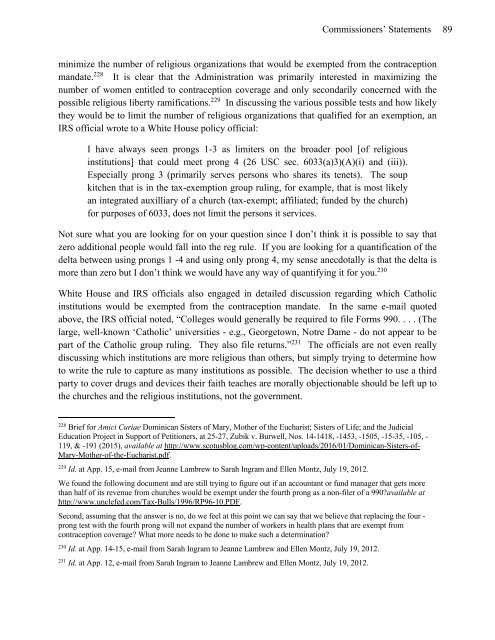PEACEFUL COEXISTENCE
2cgDkdT
2cgDkdT
Create successful ePaper yourself
Turn your PDF publications into a flip-book with our unique Google optimized e-Paper software.
Commissioners’ Statements<br />
91<br />
abstain from sex outside of heterosexual marriage. 236 In some cases, university administrators<br />
have taken issue with the requirement that full members and officers abstain from sex outside of<br />
heterosexual marriage, arguing that it discriminates on the basis of sexual orientation and<br />
therefore violates the school’s nondiscrimination policy (which is sometimes presented as an<br />
“accept all comers” policy). 237 Universities have taken this position even though the requirement<br />
to abstain from sex outside of heterosexual marriage is directed at conduct, not sexual orientation<br />
per se, and applies to people of all sexual orientations. 238 Oddly, according to public comments,<br />
universities have often taken these adverse actions against Christian student groups even though<br />
there is no aggrieved student who has been denied a leadership role in the group based on these<br />
criteria. 239<br />
The leaders of student organizations were required to sign an affirmation of the non-discrimination policy. The<br />
student leaders of Vanderbilt Catholic could not in conscience sign the affirmation since religious criteria are the most<br />
important ones for leadership in the organization. … The result is there is no registered Catholic student organization<br />
at Vanderbilt.<br />
See, e.g., InterVarsity Christian Fellowship at Grinnell College, Comment to U.S. Commission on Civil Rights (2013)<br />
(on file with the Commission); InterVarsity Christian Fellowship, formerly at Rollins College, Comment to U.S.<br />
Commission on Civil Rights (2013) (on file with the Commission)..<br />
236<br />
See CLS v. Martinez, 130 S.Ct. 2971, 2980-81 (2010).<br />
237<br />
Id. at 2979-81; see also Vanderbilt University, Comment to the U.S. Commission on Civil Rights (2013) (on file<br />
with the Commission) (“Those [religious] groups have determined that they want to be able to discriminate against<br />
other students on the basis of students’ protected status by restricting students’ eligibility for membership and to run<br />
for leadership positions.”); Carol M. Swain, Comment to U.S. Commission on Civil Rights at 1 (Feb. 27, 2013) (on file<br />
with the Commission). (“After months of framing the issue around its “non-discrimination” policy, the university<br />
made a sudden switch and began referring to the new policy as an “all-comers.””).<br />
238<br />
Jessica Laporte, Why I am a leader in TCF, TUFTS DAILY, Dec. 10, 2012 (submitted as part of InterVarsity at Tufts<br />
University Comment to the U.S. Commission on Civil Rights) (on file with the Commission).<br />
I am a woman who is attracted to both men and women, which is something I finally had the courage to accept and<br />
see in my life. Before understanding my unconditional acceptance by God, I was unwilling to admit that I was<br />
attracted to women because I was afraid of what that would mean for my life.<br />
I believe that God intended sex between one man and one woman in the context of marriage, and therefore, I will<br />
remain sexually chaste for the rest of my life or until I get married. This means that I will not date a woman….<br />
Although my orientation is not strictly “heterosexual,” I am a leader in TCF because of my beliefs about what God<br />
intended for relationships. I am not a leader in TCF because I “chose to be straight” but because I have chosen to deny<br />
myself in all things and take up my cross daily in order to follow Christ.<br />
It is difficult to hear people speaking out against TCF as an unsafe space for LGBT students, because it’s actually one<br />
of the only places that I feel comfortable discussing my sexuality.<br />
239<br />
American Center for Law and Justice and Alliance Defending Freedom, Comment to the U.S. Commission on Civil<br />
Rights, at 2 (2013) (on file with the Commission).<br />
The universities will typically claim that religious organizations are discriminating on the basis of religion—if the<br />
group requires its leaders to be Christians—and/or sexual orientation if the group requires that its leaders abide by a<br />
code of conduct that includes Biblical sexual ethics. Crucially, this claim will be made generally without any<br />
complaint of discrimination against the group. In other words, the group will be deemed “discriminatory” in the<br />
absence of a single identifiable victim of the group’s alleged discrimination.


